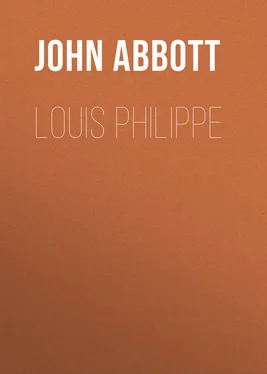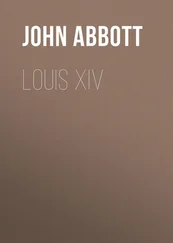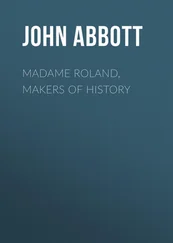John Abbott - Louis Philippe
Здесь есть возможность читать онлайн «John Abbott - Louis Philippe» — ознакомительный отрывок электронной книги совершенно бесплатно, а после прочтения отрывка купить полную версию. В некоторых случаях можно слушать аудио, скачать через торрент в формате fb2 и присутствует краткое содержание. ISBN: , Жанр: foreign_antique, foreign_prose, Историческая проза, на английском языке. Описание произведения, (предисловие) а так же отзывы посетителей доступны на портале библиотеки ЛибКат.
- Название:Louis Philippe
- Автор:
- Жанр:
- Год:неизвестен
- ISBN:http://www.gutenberg.org/ebooks/28199
- Рейтинг книги:5 / 5. Голосов: 1
-
Избранное:Добавить в избранное
- Отзывы:
-
Ваша оценка:
- 100
- 1
- 2
- 3
- 4
- 5
Louis Philippe: краткое содержание, описание и аннотация
Предлагаем к чтению аннотацию, описание, краткое содержание или предисловие (зависит от того, что написал сам автор книги «Louis Philippe»). Если вы не нашли необходимую информацию о книге — напишите в комментариях, мы постараемся отыскать её.
Louis Philippe — читать онлайн ознакомительный отрывок
Ниже представлен текст книги, разбитый по страницам. Система сохранения места последней прочитанной страницы, позволяет с удобством читать онлайн бесплатно книгу «Louis Philippe», без необходимости каждый раз заново искать на чём Вы остановились. Поставьте закладку, и сможете в любой момент перейти на страницу, на которой закончили чтение.
Интервал:
Закладка:
At Buffalo the travellers crossed the head of the Niagara River, and, passing down the Canadian shore, visited the world-renowned falls. On their way, they passed a night in the huts of the Chippewa Indians. The following extracts, written by the Duke of Montpensier to his sister, throw much light upon the character of these excellent young men. It was dated August 14, 1797:
Letter from the Duke of Montpensier.
"I hope you have received the letters which we wrote to you from Pittsburg about two months ago. We were then in the midst of a long journey, which we have terminated only fifteen days since. It occupied us four months. We journeyed during all that time a thousand leagues, and always upon the same horses, except the last hundred leagues, which we performed partly by water, partly on foot, partly on hired horses, and partly by stage, or the public conveyance.
"We have seen many Indians, and we remained even many days in their country. They are, in general, the best people in the world, except when they are intoxicated or inflamed by passion. They received us with great kindness; and our being Frenchmen contributed not a little to this reception, for they are very fond of our nation. The most interesting object we visited, after the Indian villages, was certainly the Cataract of Niagara, which I wrote you word from Pittsburg that we were going to see. It is the most astonishing and majestic spectacle I have ever witnessed. I have made a sketch of it, from which I intend to make a water-color drawing, which our dear little sister shall certainly see at our beloved mother's home.
Hardships of travel.
"To give you an idea of the agreeable manner in which they travel in this country, I must tell you, dear sister, that we passed fourteen nights in the woods, devoured by all kinds of insects, often wet to the bone, without being able to dry ourselves, and our only food being pork, a little salt beef, and maize bread. Independently of this adventure, we were forty or fifty nights in miserable huts, where we were obliged to lie upon a floor made of rough timber, and to endure all the taunts and murmuring of the inhabitants, who often turned us out of doors, often refused us admission, and whose hospitality was always defective. I should never recommend a similar journey to any friend of mine; yet we are far from repenting what we have done, since we have all three brought back excellent health and more experience.
"Adieu, beloved and cherished sister – so tenderly loved. Receive the embraces of three brothers, whose thoughts are constantly with you."
As the travellers were proceeding from Buffalo to Canandaigua, over a country so rude that they suffered more than on any other part of their journey, they met Mr. Alexander Baring, afterwards Lord Ashburton, whose acquaintance they had made in Philadelphia. Mr. Baring was on a tour to Niagara, from which the princes were returning. His patience was quite exhausted by the hardships he was enduring on the way; and he expressed the doubt whether the sight of Niagara could repay one for such excessive toil and privation. His experience must, indeed, have been different from that of the modern tourist, who glides smoothly along in the palace-cars. Arriving at Geneva, they took a boat and sailed up Seneca Lake to its head; whence they crossed over to Tioga Point, on the Susquehanna. The last twenty-five miles of this trip they accomplished on foot, each one carrying his baggage. Passing through the country, in almost a direct line, by the way of Wilkesbarre, they returned to Philadelphia.
Return to Philadelphia.
Soon after their return the yellow-fever broke out in Philadelphia with great malignity, in July, 1797. The princes had expended on their long journey all their funds, and were impatiently awaiting remittances from Europe. They were thus unable to withdraw from the pestilence, from which all who had the means precipitately fled. It was not until September that their mother succeeded in transmitting to them a remittance.
With these fresh resources they commenced a journey to the Eastern States, passing through the States of New York, Connecticut, Rhode Island, and Massachusetts, to Boston; and it is said that they extended their travels to Hallowell, in the District of Maine, to call upon the Vaughans, an illustrious family from England, then residing there.
Crossing the Alleghanies.
Louisiana at that time belonged to Spain. The exiles decided to cross the country to the Ohio, descend the river to New Orleans, and thence to proceed to Havana, on the island of Cuba, by some Spanish vessel. Returning to Philadelphia, they set out, on the 10th of December, 1797, to cross the Alleghanies. Upon those heights and gorges winter had already set in, and the cold was very severe. Just before leaving, they learned that the Directory had passed a decree banishing every member of the Bourbon family from France, including their mother, who was a Bourbon only by marriage, and that their mother had taken refuge in Spain. At that time Spain was in alliance with France, and the British Government was consequently at war against it.
Floating down the river.
At Pittsburg they found the Alleghany still open, but the Monongahela was frozen over. They purchased a small keel-boat, which they found lying upon the ice, and with considerable difficulty transported it to a point where they could launch it in the open water, though the stream was encumbered with vast masses of floating ice. Then the three brothers, with but three attendants, embarked to float down the Ohio and the Mississippi, through an almost unbroken wilderness of nearly two thousand miles, to New Orleans. When they arrived at Wheeling, Virginia, where there was a small settlement, they found their way hedged up by solid ice, which filled the stream, from shore to shore. They drew their boat upon the land, to wait for an opening through this effectual barricade. Louis Philippe, with characteristic energy, impatient of delay, ascended an eminence, and, carefully surveying the windings of the river, found that the obstruction of ice occupied only about three miles, beyond which the stream was clear.
Watching their opportunity, they forced their way through some miles of broken ice, and continued their adventurous voyage. An American military courier, less energetic, was detained three weeks by the obstructions which the French party thus speedily overcame. At Marietta, Ohio, they found another small village. Here they landed to lay in supplies; and they spent some time in examining those Indian mounds so profusely scattered there – interesting memorials of an extinct race.
Continuing their voyage amidst the masses of ice which still encumbered these northern waters, they one day, through the negligence of their helmsman, ran against a branch of a tree, termed a snag , and stove in their bows. The boat was immediately unloaded, drawn upon the shore, and in twenty-four hours was so repaired as to enable them to continue their journey. As they entered more southern latitudes the floating ice disappeared, and the voyage became more pleasant, as they rapidly floated down the tortuous stream, by forests and headlands, and every variety of wild, sublime, and beautiful scenery, until they reached New Orleans, on the 17th of February, 1798.
Welcome in New Orleans.
Here they met with a very friendly welcome, not only from the colonists generally, but from the Spanish governor, Don Gayoso. They were detained in New Orleans five weeks, awaiting the arrival of the corvette which was engaged in conveying passengers and light freight from that port to Havana. Impatient of the delay, as the packet did not arrive, they embarked in an American vessel. England was then truly mistress of the seas. She made and executed her own laws, regardless of all expostulations from other nations.
Читать дальшеИнтервал:
Закладка:
Похожие книги на «Louis Philippe»
Представляем Вашему вниманию похожие книги на «Louis Philippe» списком для выбора. Мы отобрали схожую по названию и смыслу литературу в надежде предоставить читателям больше вариантов отыскать новые, интересные, ещё непрочитанные произведения.
Обсуждение, отзывы о книге «Louis Philippe» и просто собственные мнения читателей. Оставьте ваши комментарии, напишите, что Вы думаете о произведении, его смысле или главных героях. Укажите что конкретно понравилось, а что нет, и почему Вы так считаете.












